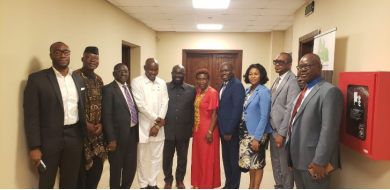Political expediency is undermining fight against GBV.
-Rights advocate warns

By Lincoln G. Peters
Monrovia, Liberia; September 18, 2025 – A Liberian human rights activist and Sexual Reproductive Health and Rights Champion (SRHR), Titus B. Pakalah, says President Joseph N. Boakai and his governing Unity Party are gradually losing the fight against Sexual and Gender Based Violence because of political expediency.
Speaking in an interview with Journalists in Monrovia on Wednesday, September 19, while providing an analysis of the fight against GBV between the former ruling Coalition for Democratic Change-led government and the Unity Party-led administration, he cautioned that political expediency continues to threaten and undermine the fight against GBV.
The SRHR advocate pointed out that Liberia has some of the strongest legal instruments to combat rape and other forms of gender-based violence (GBV). Still, weak enforcement by the Executive continues to undermine the existence of the law.
For instance, he cited the Rape Law of Liberia, the Children Law of Liberia and the Domestic Violence Act of 2019, describing them as profoundly important to GBV response, but weak enforcement continues to undermine their effectiveness, something he noted, survivors may be discouraged from reporting due to fear of stigma, secondary victimization, or retaliation.
“So, political expediency further compounds the problem. Leaders may prioritize short-term political interests over justice, sometimes shielding influential perpetrators or delaying action to avoid public backlash. This combination of enforcement gaps and political considerations weakens the implementation of progressive laws, limiting their impact on reducing GBV. This is exactly what we are seeing under the Unity Party government, especially with what is happening at the Ministry of Youth and Sports.” He observed.
Expanding on the case study, activist Pakalah disclosed that on August 28, 2025, J. Bryant McGill, Deputy Minister for Youth Development at the Ministry of Youth and Sports, was reported to Zone 8 ELWA Police Depot for allegedly raping a 14-year-old child.
He further stated that the case was referred to Hope for Women for clinical trials and/ or investigation, where it was later confirmed and established that the child had been raped.
However, he pointed out that a leaked audio recording played by media outlets shows that the alleged perpetrator used his power to attempt to compromise the case.
“From August 28, 2025, to September 17, 2025, the government has not taken immediate action against the police’s preliminary reports and the clinical investigation. This shows how power is used to prevent formal prosecution in a case that involves government officials. Well, it’s up to the government to damage its reputation and shame those once believed in the rescue mission! But the reality is, Rape is increasing and may lead to national outrage.” Mr. Pakalah cautioned.
Providing reasons why GBV cases continue to exist under the UP government, he said, lack of access to information and reports on gender-based violence (GBV) have undermined the fight, arguing that from time immemorial, governments have feared that sharing detailed GBV Situational Reports could spark outrage among grassroots movements and women-led organizations.
As a result, he further indicated that firsthand reports of GBV cases are more often shared with international NGOs (INGOs) than with local NGOs, even though the purpose of making GBV data accessible is to help build sustainable, multi-stakeholder responses, especially among women’s groups such as Community Healthcare Initiative, Women NGOs Secretariat, Female Lawyers Association of Liberia, CSO Council of Liberia, and others. Editing by Jonathan Browne



















